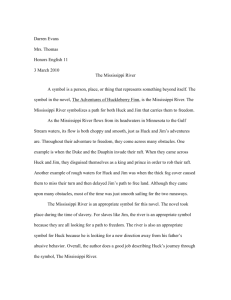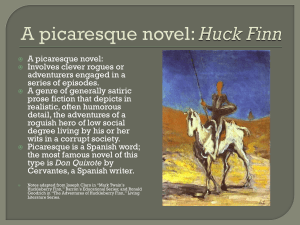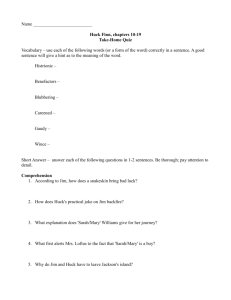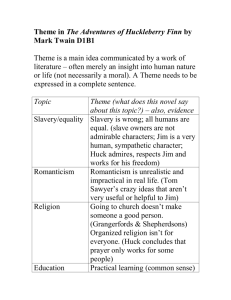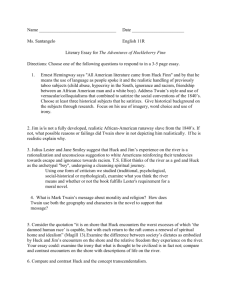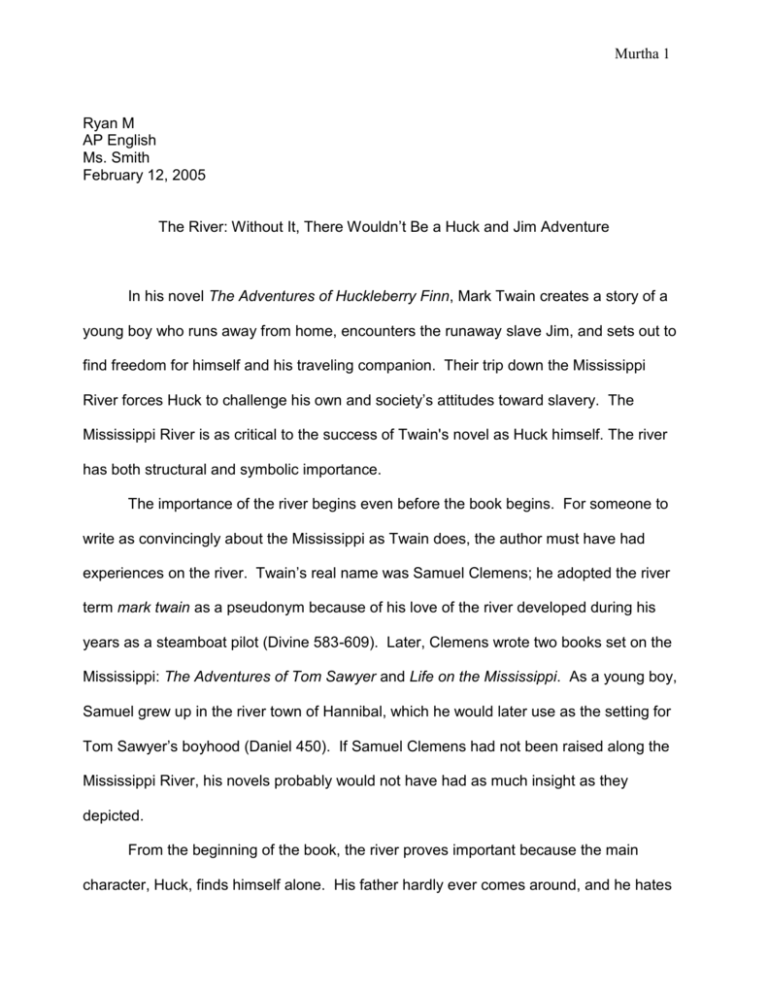
Murtha 1
Ryan M
AP English
Ms. Smith
February 12, 2005
The River: Without It, There Wouldn’t Be a Huck and Jim Adventure
In his novel The Adventures of Huckleberry Finn, Mark Twain creates a story of a
young boy who runs away from home, encounters the runaway slave Jim, and sets out to
find freedom for himself and his traveling companion. Their trip down the Mississippi
River forces Huck to challenge his own and society’s attitudes toward slavery. The
Mississippi River is as critical to the success of Twain's novel as Huck himself. The river
has both structural and symbolic importance.
The importance of the river begins even before the book begins. For someone to
write as convincingly about the Mississippi as Twain does, the author must have had
experiences on the river. Twain’s real name was Samuel Clemens; he adopted the river
term mark twain as a pseudonym because of his love of the river developed during his
years as a steamboat pilot (Divine 583-609). Later, Clemens wrote two books set on the
Mississippi: The Adventures of Tom Sawyer and Life on the Mississippi. As a young boy,
Samuel grew up in the river town of Hannibal, which he would later use as the setting for
Tom Sawyer’s boyhood (Daniel 450). If Samuel Clemens had not been raised along the
Mississippi River, his novels probably would not have had as much insight as they
depicted.
From the beginning of the book, the river proves important because the main
character, Huck, finds himself alone. His father hardly ever comes around, and he hates
Murtha 2
his guardians. When Huck’s father does come to take care of his son, he abuses him and
locks Huck in the house by the river. This house is along the river, making for a quick
escape for Huck. Huck fakes his own death and then pilots a canoe down the Mississippi
River in search for freedom. During this time, he hides out on the islands of the river while
the townspeople and his father search for him. On one of those days, Huck catches sight
of Jim. Jim had run away from his master in search of freedom; something both Huck and
Jim have in common. Then, when Huck approaches Jim, Jim becomes frightened and
asks Huck not to hurt him. When Jim realizes Huck is not dead or a ghost, they decide to
work together (Twain 49-58). From here on, Huck and Jim work together in search of
freedom as they travel on the river.
While traveling on the Mississippi River, Huck and Jim encounter many characters.
Two of those characters are King and Duke. These two conmen join Huck and Jim’s
adventure on the Mississippi, and causes Huck to think of others over his own interests.
While the group was traveling on the river, King and Duke decided they want to con a
family who has had a recent death. They wanted to scam the family and steal the
inheritance. During this project, Huck meets a young lady named Mary Jane, which
causes Huck to question what he is doing. Huck then decides to help Mary Jane and her
sisters get their inheritance back and subsequently get the conmen thrown into jail. Not
long after, Huck decides that he will do whatever it takes to free Jim, and says, ““All right
then, I’ll go to hell”” (Twain 223). This is extremely important to Huck’s character because
he is opposing society’s view on slavery. If Huck had never decided to do what he felt
was truly right, he would probably have ended up like the other characters in the book.
Murtha 3
Without the river, Huck’s life would not have changed. Without the conmen, Jim’s quest
for his freedom, and Mary Jane’s true kindness, Huck might not have ever thought of
helping others.
Perhaps the most interesting point about the river is its symbolic importance.
According to Alan Gribben, University of Texas, Mark Twain and his brother took a trip out
to the west on the Mississippi. Does this trip allude to Huck and Jim’s adventure? Mark
Twain could have encountered a diverse number of people which he used as his
characters. If the reader of The Adventures of Huckleberry Finn, analyzed the Mississippi
River, the reader would realize the river is a symbol of Huck’s life. The beginning of the
river trip symbolizes the start of Huck’s journey through life. As his life progressed, he
meets people who represent certain aspects of society. Mary Jane, for example,
represents the true nature of women, caring and loving. When Huck finally reaches the
West, it symbolizes the end of his life’s journey as well as his freedom from society. If
there had not been a river, then Huck life would never have happened as it did.
According to T.S. Eliot, the Mississippi River is extremely vital to the book. Eliot
states that there are two elements which make the book great, one of which is the
Mississippi River, and the other is Huck. Eliot also states the purpose of the Mississippi
River is it gives the book its form and, “a river, a very big and powerful river…can wholly
determine the course of human peregrination” (Eliot 348-354). Without the Mississippi
River, the journey of Huck and Jim would never have taken place and their relationship
would never have developed causing a moral dilemma for Huck regarding his helping Jim
escape.
Murtha 4
Here Jim, a fugitive from the law, is hiding and finding sanctuary on an island in the
Mississippi River, and then comes a fugitive of society, Huck, fleeing down the Mississippi
River from a life of despair and abuse. Even the characters who Huck and Jim encounter
throughout their journey either live or work on the Mississippi. T.S. Eliot also says that the
river is the ruler of the journey, not allowing Huck and Jim to reach Cairo. Without the
river, the adventures of Huck and Jim could not have taken place in the same way.
The Mississippi River proves to be extremely important both structurally and
symbolically. If the river ceased to exist, Huck would never have encountered characters
like Mary Jane, who changed his life. Furthermore, the river served as a symbol of Huck’s
life. Traveling on the river and meeting important characters is similar to the journey of life
by encountering people and events which can change life. So, without the river, Mark
Twain’s novel The Adventures of Huckleberry Finn, would not have been as enjoyable and
symbolic as it depicted life’s never-ending journey.
Murtha 5
Works Cited
Daniel, Kathleen. Ed. “Mark Twain (1835-1910).” Elements of Literature Fifth Course
Literature of the United States. New York: Holt, Rinehart and Winston, 2000. 450451.
Divine, Robert A., ed. “Political Realignments in the 1890s, 1890-1900.” America Past
and Present. New York: Pearson Longman, 2003. 583- 609.
Eliot, T. S. “Introduction to The Adventures of Huckleberry Finn.” London: Cressent P,
1950. vii – xvi. Rpt. in The Adventures of Huckleberry Finn. Ed. Thomas Cooley.
3rd ed. A Norton Critical Edition. New York: Norton, 1999. 348– 354.
Gribben, Alan. Mark Twain 1835- 1910. 1 Feb. 2005.
<http://docsouth.unc.edu/twainlife/bio.html>. University of Texas. 8 Feb. 2005
Twain, Mark. Adventures of Huckleberry Finn. Ed. Thomas Cooley. 3rd ed. A
Norton Critical Edition. New York: Norton, 1999.




